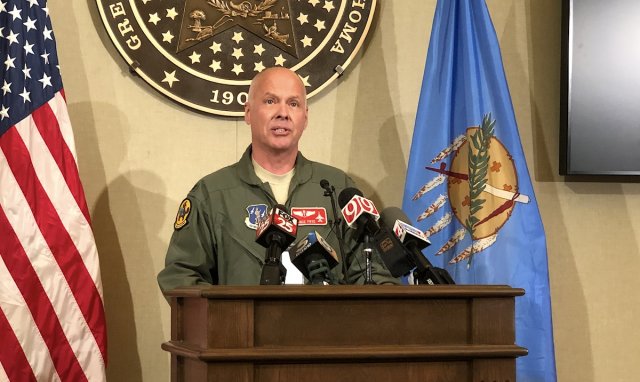

Gov. Kevin Stitt has announced Col. Lance Frye — a physician who serves as the state air surgeon of the Oklahoma Air National Guard — to be his next commissioner of health.
“We have found an incredible choice to be our next leader at the State Department of Health,” Stitt said at a Friday morning press conference. “Col. Frye is a proven leader and highly qualified medical expert who has faithfully served our country and state with a focus on the health of those around him for over 25 years.”
Frye, 57, has already been working on the state’s response to the COVID-19 pandemic, appearing with the governor last week to discuss testing and tracing efforts in Texas County, the site of the state’s largest coronavirus outbreak.
“He went himself. This is no surprise coming out of someone who has worked in-theater, literally picking up wounded folks off of battlefields,” Secretary of Health and Mental Health Jerome Loughridge said at today’s press conference. “It is no surprise that his first response when we had an outbreak would be to go himself.”
Loughridge praised Frye’s “capability and character.”
“Col. Frye had the organizational acumen, the leadership capability, he had the command presence to help us develop what at this point is being hailed as a leading model for surge planning in rural states,” Loughridge said. “Col. Frye was central to the development of that plan.”
While the Lindsay native will become interim commissioner of health, Stitt said he intends to pursue Frye’s confirmation as permanent commissioner of health when the time comes. State law specifies that nominations made after May 1 are considered interim appointments, meaning the Senate will have until the end of the 2021 regular session to confirm or deny.
As a physician, Frye meets the statutory requirements. He also serves as interim department chair and residency program director at the OSU Center for Health Sciences.
Military, obstetrics helped Frye handle ’emergent situations’
Loughridge and Stitt praised Frye’s military service, which included deployments in Iraq and for Operation Enduring Freedom. Frye served as part of a helicopter rescue team, something he said has helped him during the pandemic.
“Some people are really good at dealing with emergent situations, and I’ve always been pretty good at that. I think my military training had a tremendous amount to do with it,” Frye said. “Quite honestly, being an OB-GYN is either really great or it’s an emergency. So you learn how to handle those situations well.”
Frye said he believes the state is well positioned to deal with a second surge of COVID-19 cases, should that occur.
“We’ve developed a plan. We’ve got it in place. We are going to continue to strengthen that,” Frye said. “Luckily, we didn’t have to fully engage the plan throughout every hospital in the state. We saw what went well and what we can learn from, and we are going to continue to improve.”
Frye praised the Department of Health employees who will now be in his charge.
“I have seen the long hours you have put in. I am going to work with you to support you any way that I can,” he said. “It requires everyone. It requires teamwork. What I’ve really seen and enjoyed and been proud of is that the governor was able to put together a multi-agency group of people that really brought Oklahomans together to work through this.”
Background on commissioner of health post
Stitt nominated longtime county health department administrator Gary Cox to the state’s top public health post in September. But the pick was soon criticized because Cox did not meet the requisite academic standards in state statute. As lawmakers debated whether to change the law to make Cox eligible, he came under added scrutiny in the form of an audit request by Attorney General Mike Hunter. State Auditor and Inspector Cindy Byrd agreed to conduct the audit of the Oklahoma State Department of Health’s spending as it relates to addressing COVID-19.
Ultimately, lawmakers decided not to even hold a hearing on Cox, who eventually released a letter saying he would step aside at the end of May.
“It puts us in a bind,” Stitt said May 12. “It’s going to be hard to get things done (during this pandemic).”
Even before taking office, Stitt had talked of reforming the long-troubled state agency.
The Oklahoma State Department of Health also came under federal and state review in October 2017 after the agency’s antiquated financial system lost track of $30 million in federal funding. The scandal yielded the resignation of longtime commissioner of health Terry Cline and resulted in a series of recommendations from the state’s multi-county grand jury, which have mostly not been followed.
Stitt praised OSDH employees for their work during the pandemic.
“There is no doubt in my mind that the team he assembled at the State Department of Health is responsible for saving many, many lives,” he said. “We will not miss a beat.”




















